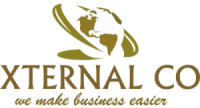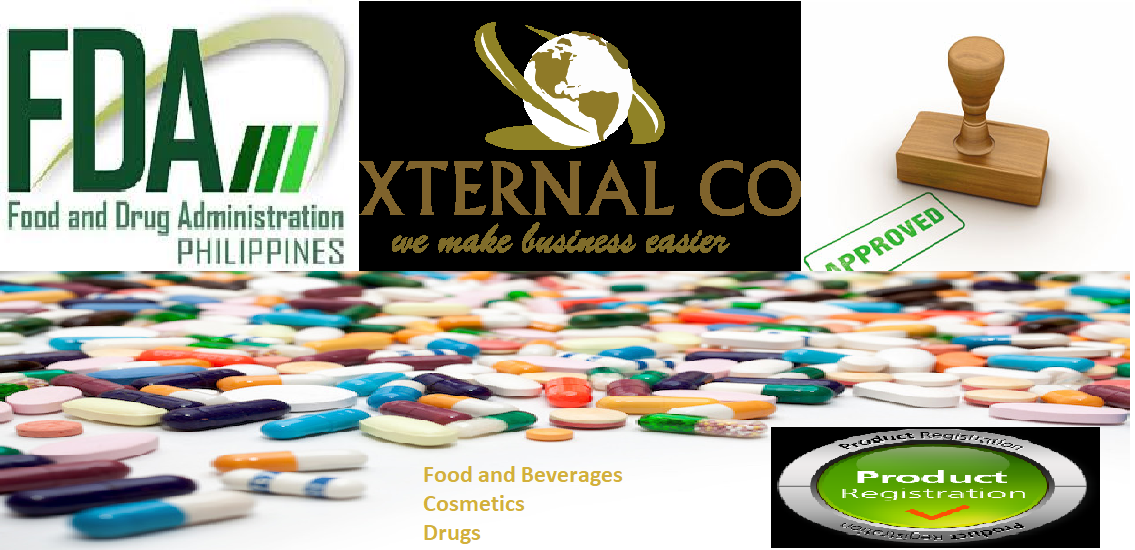FDA
The Food and Drug Administration (FDA) Philippines
Previously called Bureau of Food and Drugs is responsible for safeguarding public health and safety through enforcing its standards on all products relating to food, drugs, cosmetics, medical devices, and household hazards that are available in the Philippine market. The FDA is also tasked to regulate the production, sale, and traffic of said products to protect the health and safety of the people.
One of the main roles of FDA is to issue a License to Operate to institutions as importer, distributor, wholesaler, or manufacturer of food, drugs, cosmetics and medical devices with technical requirements in compliance to their regulations. Before it can enter the Philippine market, Products are issued a Certificate of Product Registration (CPR), and must comply with the technical requirements and suggested standards of identity, purity and quality set by FDA.
Xternal Co can support and assist your company in the step-by-step processing and obtaining of LTOs and CPRs from FDA, as well as offer services for investors and entrepreneurs looking to do business in the Food, Cosmeceutical and Pharmaceutical Industries in the Philippines. We will assist our clients on how to be compliant with the agency’s regulatory processes and enforcement regulations.
Services provided:
- Orientation to the correct processes and procedures in applying for corporation and product registration.
- Guidance in gathering and preparation of all necessary documents to avoid refusal and avoids submission of incomplete documents.
- Attainment of approved applications by monitoring the step-by-step process necessary for approval.
License to Operate
For a corporation to be able to import, distribute, market, advertise or manufacture their products here in the Philippines, they must first acquire a License to Operate (LTO) as Importer/Distributor/Wholesaler, for products imported from different countries, or as Manufacturer, for locally manufactured products. After securing an LTO, businesses may then proceed to apply for a Certificate of Product Registration (CPR), which states that the product has been properly assessed and officially registered with the Philippine FDA.
Establishments under industries requiring a License to Operate as manufacturer, importer, distributor, wholesaler, or exporter:
- Food
- Drugs
- Cosmetics
- Household Hazards
- Veterinary Products
- Medical Devices (to be submitted to the Department Of Health – Center for Device, Regulation, Radiation Health and Research)
Requirements:
- Accomplished and duly notarized Petition Form and Joint Affidavit of Undertaking;
- List of products to be distributed, identified by generic names and brand names intended for use;
- Copies of Pharmacist Board Registration Certificate, PRC ID, valid PTR, ID picture, and Duties and Responsibilities;
- Certificate of Attendance of owner or pharmacist to an FDA seminar on Licensing of Drug Establishments;
- Certificate of Registration with SEC and Articles of Incorporation/Partnership (for corporations or partnerships);
- Certificate of Business Name Registration with DTI (for single proprietorships);
- Locational plan and floor plan (office and storage room) with dimensions; and
- Contract of lease for the space to be occupied.
If Importer
- Foreign Agency Agreement (FAA) from each supplier, duly authenticated by the Territorial Philippine Consulate
- Certificate of Registration of manufacturer and its conformity with the Good Manufacturing Practices From Health Authority authenticated by the Philippine Consulate
If Wholesaler
- Valid current contract with FDA licensed supplier/manufacturer
- Certificate of product registration from FDA
- Copy of LTO from supplier/manufacturer
If Exporter
- Valid current contract with FDA licensed supplier/manufacturer
- Certificate of product registration from FDA
- Copy of LTO from supplier/manufacturer
Requirements for verification during inspection:
- Reference materials:
- Philippine National Drug Formulary (latest edition)
- A. 3720: Foods, Drugs, Devices & Cosmetics Act
- A. 6675: Generics Act of 1988 and Relevant Implementing Rules and Regulations
- A. 5921: Pharmacy Law as amended and Relevant Implementing Rules and Regulations
- Latest edition of United State Pharmacopoeia/National Formulary (USP/NF), or Remington’s Pharmaceutical Sciences, or Goodman & Gilman’s The Pharmacological Basis of Therapeutics
- Batch Distribution Record Book
Procedure:
- Submit application requirements to FDA;
- Interview with the Food and Drug Registration Office (FDRO);
- Review of complete requirements and application by the Licensing Department;
- Receive Order for Payment and complete application;
- Request for schedule of inspection;
- Physical inspection of office and facility by the FDRO;
- Approval of the LTO by the Director; and
- Release of documents to applicant.
Certificate of Product Registration
Before a corporation’s products are permitted entry into the Philippine market, each of these products must undertake separate product registration processes.
There are different registration requirements and respective processing timelines depending on the classification of each product (food, food supplement, drug, cosmetic, household hazardous, pesticides, medical device, diagnostics or veterinary products).
Requirements:
- Accomplished and duly notarized application forms No.1 and No.8;
- Copy of valid contract between manufacturer and trader/distributor/seller/exporter/importer;
- Copies of valid LTOs for manufacturer/trader/distributor/seller/exporter/importer;
- Unit dose and batch formulation (in metric system);
- Technical specifications on all raw materials;
- Certificate of Analysis on raw materials and finished product from manufacturer;
- Technical specifications of finished product;
- Master manufacturing procedure, poduction equipment, sampling and in-process controls;
- Assay on test procedures and data analysis (if applicable);
- Stability study in accordance with the Philippine national guidelines and ASEAN guidelines;
- Representative sample of packaging and labeling materials for commercial market;
- Copy of ACB approval; and
- Copy of the original Product Registration in the manufacturing country (for foreign manufactured products)
Procedure:
- Submit application and all requirements to Public Assistance Information and Compliance Section of FDA for assessment;
- Proceed to Accounting and Billing Department to have registration fees assesed and paid for;
- Obtain endorsement for Certificate of Registration after evaluation of Product Services Division; and
- Secure signed Certificate of Registration and Product Registration documents from FDA.
BIR Importer’s Clearance Certificate (BIR ICC)
The Bureau of Customs (BOC) has simplified the process and the requirements of new importers and customs brokers as the government pursues to streamline the accreditation process.
To register as an importer, businesses first need an Import Clearance Certificate (ICC) from the Bureau of Customs (BOC) and set up an account with the Client Profile Registration System (CPRS). The Import Clearance Certificate is valid for three years while the Customs Client Profile Accreditation must be updated annually.
Under Customs Memorandum Order (CMO) Number 5-2018, As replacement for the ICC and the BCC, new importers will be required to secure an AMO application form and submit several other requirements:
– BOC official receipt of P1,000 processing fee payment
– Affidavit designating authorized signatories in import entries
– Two valid identification cards (IDs)
– NBI clearance
– Latest General Information Sheet (GIS)
– Personal profile of applicant and officers
– Company profile
– Address of warehouse
– Proof of lawful occupancy
– List of products to be imported
– Printed Client Profile Registration System (CPRS) notification
– Endorsement from the collector
– BIR Registration
– Latest income tax return
– Mayor’s permit
For licensed customs brokers applying for accreditation, they will be required to submit the following:
– AMO application form
– BOC official receipt for P1,000 processing fee
– valid PRC card
– list of clients with addresses and contact details
– list of representatives with personal details, photos and specimen signature
– printed CPRS notification
– BIR registration
– latest income tax return
– NBI clearance
– certificate of good standing issued by the PRC-accredited national organization for customs brokers.
For customs brokers applying for renewal, they are required to submit the following:
– Updated professional profile
– valid PRC card
– updated list of clients with addresses and contact details
– updated list of representatives with personal details, photos and specimen signature.
– printed CPRS notification
– income tax return for the past three years
– NBI clearance
– certificate of good standing issued by the PRC-accredited national organization for customs brokers
Export Clearance
First time exporters need to register with the CPRS through the Philippine Exporters Confederation. Similar with importers, the CPRS accreditation must be renewed annually. For some types of exporters, the Philippines requires additional registration. For instance, coffee exporters must register with the Export Marketing Bureau. Exporters operating out of a special economic zone (SEZ) must register with the Philippine Economic Zone Authority (PEZA) while companies exporting out of free port zones must register with the specific free port. Once registered, exporters will receive a Unique Registration Number, required for all export activity.
Businesses exporting out of the Philippines must provide the following documents before their goods depart:
- Packing List;
- Invoice;
- Bill of Lading;
- Export License;
- Customs Export Declaration; and
- Certificate of Origin
Additional documents for certain export products:
Certain products require government permission to be exported. Below is a detailed list of products requiring additional permission as well as the concerned government authority:
- Endangered species of flora and fauna (Bureau of Biodiversity Management);
- Animals and animal products (Bureau of Animal Industry);
- Fish and fish products (Bureau of Fisheries and Aquatic Resources);
- Plants (Bureau of Plant Industry);
- Rice (National Food Authority);
- Radioactive materials (Philippine Nuclear Research Institute) and;
- Sugar and molasses (Sugar Regulatory Administration).

